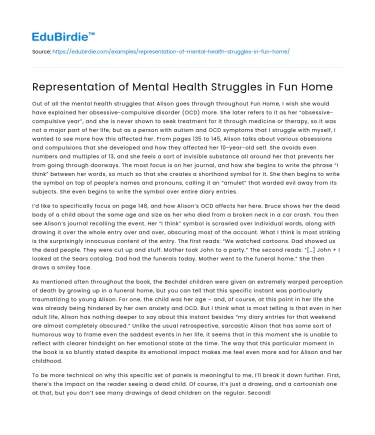Out of all the mental health struggles that Alison goes through throughout Fun Home, I wish she would have explained her obsessive-compulsive disorder (OCD) more. She later refers to it as her “obsessive-compulsive year”, and she is never shown to seek treatment for it through medicine or therapy, so it was not a major part of her life; but as a person with autism and OCD symptoms that I struggle with myself, I wanted to see more how this affected her. From pages 135 to 145, Alison talks about various obsessions and compulsions that she developed and how they affected her 10-year-old self. She avoids even numbers and multiples of 13, and she feels a sort of invisible substance all around her that prevents her from going through doorways. The most focus is on her journal, and how she begins to write the phrase “I think” between her words, so much so that she creates a shorthand symbol for it. She then begins to write the symbol on top of people’s names and pronouns, calling it an “amulet” that warded evil away from its subjects. She even begins to write the symbol over entire diary entries.
I’d like to specifically focus on page 148, and how Alison’s OCD affects her here. Bruce shows her the dead body of a child about the same age and size as her who died from a broken neck in a car crash. You then see Alison’s journal recalling the event. Her “I think” symbol is scrawled over individual words, along with drawing it over the whole entry over and over, obscuring most of the account. What I think is most striking is the surprisingly innocuous content of the entry. The first reads: “We watched cartoons. Dad showed us the dead people. They were cut up and stuff. Mother took John to a party.” The second reads: “[…] John + I looked at the Sears catalog. Dad had the funerals today. Mother went to the funeral home.” She then draws a smiley face.
Save your time!
We can take care of your essay
- Proper editing and formatting
- Free revision, title page, and bibliography
- Flexible prices and money-back guarantee
As mentioned often throughout the book, the Bechdel children were given an extremely warped perception of death by growing up in a funeral home, but you can tell that this specific instant was particularly traumatizing to young Alison. For one, the child was her age – and, of course, at this point in her life she was already being hindered by her own anxiety and OCD. But I think what is most telling is that even in her adult life, Alison has nothing deeper to say about this instant besides “my diary entries for that weekend are almost completely obscured.” Unlike the usual retrospective, sarcastic Alison that has some sort of humorous way to frame even the saddest events in her life, it seems that in this moment she is unable to reflect with clearer hindsight on her emotional state at the time. The way that this particular moment in the book is so bluntly stated despite its emotional impact makes me feel even more sad for Alison and her childhood.
To be more technical on why this specific set of panels is meaningful to me, I’ll break it down further. First, there’s the impact on the reader seeing a dead child. Of course, it’s just a drawing, and a cartoonish one at that, but you don’t see many drawings of dead children on the regular. Secondly, you don’t just hear about Alison’s “I think” symbol – you see it, and you see the way it’s scribbled over and over, obscuring her whole journal entry. I was extremely disappointed when “I think” was not incorporated into the musical at all, as it seems that you could easily make a song around a repeating, “I think” lyric. Anyway, you can see how this symbol overtakes her journal. It is integrated over or between most of the words, much more prevalent than you might think if you just were to read her description of the journal rather than the journal itself. And, as previously stated, the bluntness and literalness of the captions give you the uneasy feeling that this event still troubles Alison – or worse, she doesn’t realize how much it actually affected her. I wanted to pick a set of panels centered on Alison’s OCD because I relate to it, but doing page 148 specifically has left me thinking about what situations from Alison’s childhood are still sitting, unaddressed, troubling her in the back of her mind.






 Stuck on your essay?
Stuck on your essay?

